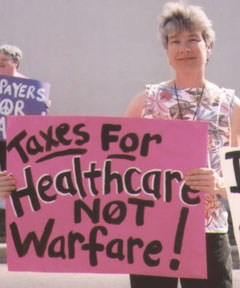While there has been some comparison of military spending versus medical costs, it seems as though many are less willing to address the issue of societal sickness caused by military spending. It needs to be named, identified, and articulated. And even fewer people refuse to stop paying for death and destruction.
At a recent webinar with U.N. officials, the Vatican called for disarmament in light of the health crisis experienced as a result of the coronavirus from a humanizing perspective: “The pandemic offers us a precious opportunity… prompts us to question how much the huge military expenditures are really able to guarantee the security of individual populations, of how much these resources could and should be allocated to investments to other ends. The pandemic is further shaking an already unstable world, where climate chaos and war compete for the dubious honour of most perilous threat.”
Public Citizen recently reported that ⅓ of Covid deaths were related to a lack of insurance—emphasizing the need for Medicare for All. Currently, over 87 million people in the U.S. are uninsured or underinsured, with many joining these ranks after losing their employment because of the Covid outbreak and subsequent shutdown. Since the beginning of the outbreak, “health insurers” have seen record profits because they have not had to pay out claims as people in the U.S. have delayed seeking health care treatment either acutely or preventatively.

woman holding pink sign with black text: “Taxes For Healthcare NOT Warfare”
In making the case of Medicare for All in 2019, Rep. Jayapal for the State of Washington said, “The state of our healthcare system is absolutely atrocious… how is it possible that the United States, the richest country in the world, is the only major country that does not guarantee healthcare to our residents?“
In another report, it was said that there was a 20% increase in deaths deemed “collateral damage” due to the pandemic. While the deaths were not specifically related to Covid infections, they were due to disruptions in healthcare, especially with those impacted by chronic diseases. There has been a rise in diseases in the U.S. that some have linked to the post-World War II era and the saturation of leftover pollutants from that war into the environment.
Forbes reports, “However, the CDC data do make an important point: that Americans’ poor state of health, mostly related to our own lifestyles, made the U.S. dramatically more vulnerable to Covid.” It is interesting that for some time the military has attempted to justify military operations as a way of defending the U.S. way of life, yet it is this very way of life that is making us sick, exacerbating the impact of the pandemic, and depriving us of the resources to respond both proactively and reactively to the greatest threats to the well being of human and all life on the planet.

Image by MasterTux from Pixabay.
Kathy Kelly shared in a panel of War Tax Resisters how as a holistic approach to resistance included taking responsibility for her health. That is not to say that we should not have structures in place to ensure care for others, but rather it entails naming what ills us and taking action. I am reminded of a repeated refrain that I have heard at a neighborhood association in the heart of St. Louis when addressing emergency preparedness: “No One is Coming for Us.”
For three decades agencies of the military have known that a massive pandemic has been likely to occur with the climate crisis impacting the severity. War Tax Resister Lindsey Britt recently wrote a piece about the need to critically examine the mono-narrative that is assumed about Death and Taxes and to examine that tension collectively. Britt articulated the tension eloquently in her article, “Our Taxes Are Our Legacy.”
Let us take this precious opportunity and raise these issues, especially in the lead up to tax day. Let us know what you are planning and how NWTRCC can support your efforts.
Post by Chrissy Kirchhoefer
